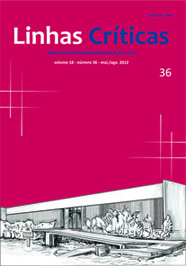Text genre in mathematics literacy and mathematics textbooks of the PNLD 2010 PNLD 2010
DOI:
https://doi.org/10.26512/lc.v18i36.3936Keywords:
Textbooks, Mathematical literacy, Text Genre, Text SupportAbstract
This article discusses how the concept of text genre appears in some of the stages of the PNLD 2010 actions and how some books indicated by the Guide of textbooks propose activities with text genre to explore mathematical contents. Documents involved in the PNLD selection process and two textbooks of an approved collection were analyzed under a theoretical framework based on Marcuschi and Chartier. Distortions concerning the notions of text genre and type can be seen in the Guide’s reviews. As for the books, few of them present activities that explore texts in their general constitutive aspects. Moreover, the proposed activities have little to do with the mathematical content presented in the texts.
Downloads
References
BAKHTIN, M. Marxismo e filosofia da linguagem: problemas fundamentais do método sociológico na ciência da linguagem. 9. ed. São Paulo: Hucitec, 1999.
Brasil. Fundação Nacional de Desenvolvimento da Educação. Decreto nº 7.084, de 27 de janeiro de 2010. Dispõe sobre os programas de material didático e dá outras providências. Brasília: MEC/SEB, 2010. Disponível em: <http://portal.mec.gov.br/dmdocuments/decreto_programa_livro.pdf>. Acesso em: 23 jun. 2010.
______. Secretaria de Educação Básica. Guia de livros didáticos PNLD 2010: alfabetização matemática e matemática. Brasília: MEC/SEB, 2009. Disponível em: . Acesso em: 8 out. 2011.
______. Fundação Nacional de Desenvolvimento da Educação. Anexo IX: Princípios e critérios para a avaliação de livros destinados aos anos iniciais do ensino fundamental ”“ PNLD 2010. In: Edital de convocação para inscrição no processo de avaliação e seleção de obras didáticas a serem incluídas no guia de livros didáticos de 1º ao 5º ano do PNLD 2010. Brasília: MEC/SEB, 2008. p. 35-72. Disponível em: . Acesso em: 1º jun. 2010.
______.Conselho Nacional de Educação. Resolução nº 3, de 3 de agosto de 2005. Define normas nacionais para a ampliação do Ensino Fundamental para nove anos de duração. Brasília: CNE/CEB, 2005.
______. Secretaria de Educação Básica. Ensino Fundamental de Nove Anos: orientações gerais. Brasília, DF: MEC/SEB, 2004.
______. Ministério da Educação. Parâmetros Curriculares Nacionais: língua portuguesa - terceiro e quarto ciclos do ensino fundamental. Brasília: MEC/SEF, 1998.
BRITO, M. R. F. Solução de problemas e a matemática escolar (org.). Campinas: Alínea, 2006.
BRONCKAR, J. P. Atividade de linguagem, textos e discursos: por um interacionismo sociodiscursivo. 2. ed. São Paulo: EUDC, 2009.
CHARTIER, R. A medicação editorial. In: _______. Os desafios da escrita. São Paulo: UNESP, 2002.
FÁVERO, L. L.; KOCH, I. Linguística textual: introdução. 4. ed. São Paulo: Cortez, 2002.
INEP. Resultados do 4º INAF/Brasil:um diagnóstico para a inclusão social pela educação (Habilidades Matemáticas). São Paulo: 2004. Disponível em: <http://www.ipm.org.br/ipmb_pagina.php?mpg=4.02.00.00.00ever=por>. Acesso em: 30 ago. 2008.
_____. PISA 2000: relatório nacional. Brasília: MEC, 2001. Disponível em: <http://www.inep.gov.br/download/internacional/pisa/PISA2000.pdf>. Acesso em: 12 set. 2008.
MARCUSCHI, L. A. Produção textual, análise de gêneros e compreensão. São Paulo: Parábola Editorial, 2008.
______. A questão do suporte dos gêneros textuais. UFPE, 2003a. Disponível em: <http://www.bbs.metalink.com.br/~lcoscarelli/GEsuporte.doc>. Acesso em: 4 jul. 2010.
______. Gêneros textuais: definição e funcionalidade. In: DIONISIO, A. P.; MACHADO, A. R.; BEZERRA, M. A. (org.). Gêneros textuais e ensino. 2 ed. Rio de Janeiro: Lucerna, 2003b.
MENEGHELLO, M.; PASSOS, A. De olho no futuro: alfabetização matemática, 1º ano. São Paulo: Quinteto Editorial, 2008a.
______. De olho no futuro: matemática, 3º ano. São Paulo: Quinteto Editorial, 2008b.
SHOLZE, L.; RÖSING, T. M. K. (org.). Teorias e práticas do letramento. Brasília: INEP, 2007.
Downloads
Published
How to Cite
Issue
Section
License
Copyright (c) 2016 Linhas Críticas

This work is licensed under a Creative Commons Attribution 4.0 International License.
Authors who publish in this journal agree to the following terms:
-Authors maintains the copyright and grants the journal the right of first publication, the work being simultaneously licensed under the Creative Commons Attribution License which allows the sharing of the work with recognition of the authorship of the work and initial publication in this journal.
- Authors are authorized to enter into additional contracts separately, for non-exclusive distribution of the version of the work published in this journal (eg publish in institutional repository or as a book chapter), with acknowledgment of authorship and initial publication in this journal.
-Authorers are allowed and encouraged to publish and distribute their work online (eg in institutional repositories or on their personal page) at any point before or during the editorial process, as this can generate productive changes as well as increase the impact and the citation of published work (See The Effect of Free Access).



